TL;DR
Social media won’t boost your search rankings directly, but it amplifies the signals that do. It drives eyeballs to your content, earns backlinks, and builds brand authority - three pillars of off-page SEO. Think of it as a visibility engine: the more your content is seen, shared, and trusted, the more search engines take notice. When paired with an intentional SEO strategy, social platforms become fuel for faster indexing, stronger credibility, and greater discoverability.
Quick wins: how social media fuels your SEO
-
Drives qualified traffic: More eyeballs = more opportunities. Every click from a social post brings a real person to your site, boosting engagement, time on page, and conversion potential.
-
Builds real-world authority: Social shares lead to backlinks. Mentions build trust. Search engines take cues from what people actually talk about.
-
Speeds up indexing: The faster search engines find your content, the faster it can rank. Social links act like a spotlight for your latest posts.
-
Supports your keyword game: When your posts and profiles are optimised, you show up more on Google and inside platforms like LinkedIn, YouTube, and Twitter.
-
Strengthens brand signals: Consistent content, engagement, and a clear profile tell search engines: “This brand is legit.”
-
Amplifies reach through influencers: Collaborating with voices your audience already trusts gives you borrowed authority and opens doors to high-quality backlinks.
-
Leverages AI-driven discovery: Social signals matter more in a world where AI curates what people see. Engagement patterns increasingly influence how and where your content surfaces.
How social media affects SEO: clarity, strategy, and real results
Wondering if social media really affects your SEO? The short answer is yes, but not in the way many think. Social media is not a direct ranking factor, but it is a powerful amplifier. It increases the visibility of your content, drives meaningful traffic, and creates opportunities for backlinks. All of these are essential ingredients for strong SEO performance.
This guide breaks down how social media supports your search visibility and gives you actionable strategies to align your efforts with better outcomes.
Key takeaways
-
Social media increases your chances of being found. More traffic, more engagement, and more links lead to higher visibility in search engines.
-
Adding social sharing buttons makes it easier for your audience to spread your content. This expands your reach and boosts brand awareness.
-
Partnering with the right influencers puts your content in front of new, relevant audiences. It also increases the likelihood of gaining high-quality backlinks.
-
Being active and consistent on social platforms builds credibility. It encourages brand mentions and strengthens your online reputation.
-
Optimising your profiles and using the right keywords helps them appear in both search results and on-platform searches. This drives more qualified traffic to your website.
The Real Link Between Social Media and SEO
Social media and search engine optimisation are not separate silos. They work together. While social platforms do not directly impact search rankings, they play a crucial role in getting your content seen, clicked, and shared.
Every time your content is shared on platforms like LinkedIn, Instagram, or Facebook, it reaches new audiences. That visibility drives real traffic to your website, increases engagement, and raises the odds of earning backlinks from credible sources.
A strong social presence also boosts your perceived authority. Search engines watch for signals like brand mentions, referral traffic, and consistent link-building. These are all influenced by how active and engaging you are on social media.
Pro tip: Add UTM parameters to every link you share. This lets you see exactly which platforms are pushing traffic and contributing to your SEO results.
How social media supports SEO in practice
Social media does not directly move you up the rankings, but it influences the signals that do. It affects three key areas search engines care about: traffic, authority, and indexability.
When people discover your content through social platforms, they visit your site, engage with your brand, and sometimes link back to your content. All of this sends trust signals to search engines and increases your chances of being found in search results.
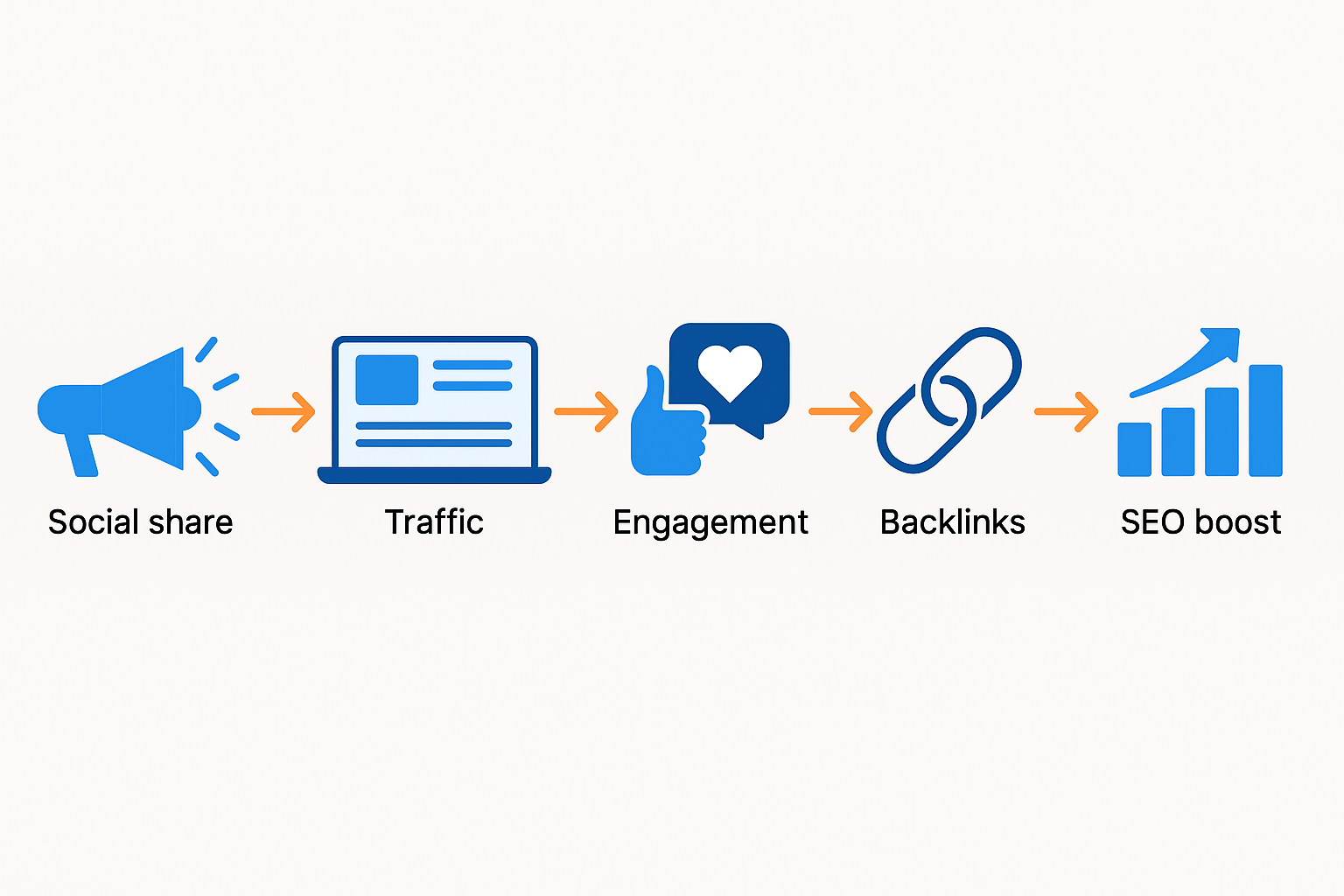
Increases website traffic
Social media gives your content a second life outside of search engines. Every post, share, or tag is a new entry point to your site for people who may never have found you through Google alone.
The more your content resonates, the more it gets shared. That expands your reach, strengthens your brand identity, and drives consistent referral traffic. Over time, this steady flow tells search engines that your content is valuable and relevant.
A SEMrush study found that businesses with an active social media presence consistently see higher traffic and stronger visibility across both AI-driven platforms and traditional search engines.
Builds website authority
Social signals such as likes, shares, comments and mentions do not directly influence rankings, but they act as trust indicators. When your content gains attention, it becomes more likely to attract backlinks from credible sources. Backlinks remain one of the strongest SEO ranking factors.
According to Moz while social signals are not direct ranking inputs, they contribute to visibility, traffic and link-building potential.
A consistent and active presence on social media also strengthens your brand’s credibility. When people engage with or mention your brand regularly, search engines take notice. Over time, this helps boost your domain authority and trustworthiness in the eyes of both users and algorithms.
Supports better indexing and visibility
Every time you share a link on social media, you create a new pathway for discovery. Platforms like X, LinkedIn and Facebook help search engine crawlers find and index your content more quickly.
An active and well-managed social presence also signals that your brand is current and relevant. This can increase the chances of your content and profiles showing up in search results, particularly for branded or informational queries.
For small Irish businesses, this kind of exposure is critical. It puts you in front of people who are already searching for what you offer.
Pro tip: Create content that people want to share. Every reshare expands your reach, strengthens authority and opens the door to potential backlinks.
How social sharing affects structured data and preview optimisation
The way your content appears when shared on social media is not random. It is shaped by structured data and metadata, especially elements like Open Graph tags and Twitter Cards. While these do not directly affect rankings, they influence how users engage with your content and how search engines interpret it.
-
Open Graph tags help control how your title, image and description display when your content is shared on platforms like Facebook and LinkedIn. Clear, well-optimised OG tags can increase click-through rates and drive more engagement.
-
Twitter Cards enable richer previews on X. These include headlines, images and meta descriptions, which can improve how visible and appealing your content looks in a crowded feed.
-
Schema markup is not used directly by social platforms, but it helps search engines better understand your content. When combined with strong social signals, it can improve how your pages are presented in search results.
Pro Tip: Use tools like MetaTags.io or OpenGraph.xyz to check how your content will display before sharing it.
Strategies for integrating social media into SEO
Bringing social media into your SEO strategy is not just a nice-to-have. It is a force multiplier. Done well, it expands your reach, builds authority and drives more organic traffic from both search engines and social platforms.
The following tactics are proven to improve visibility, strengthen your brand and create more opportunities for discovery across channels.
Include social sharing buttons on your website
Make sharing easy. Add clear, visible buttons to your blog posts, landing pages and product pages. The simpler it is for users to share, the more likely your content is to reach new audiences across platforms like Facebook, LinkedIn and X.
Each share expands your reach and drives fresh traffic. More importantly, it creates signals around your content that can lead to backlinks, brand mentions and media coverage. All of these help improve your visibility in search.
Optimise your social media profiles
A well-optimised profile increases your chances of showing up in both search engines and social platform results. It also builds trust with anyone who discovers your brand for the first time.
Make sure your profiles include:
-
A clear, keyword-aligned description of what you do
-
A link to your website or key landing pages
-
Branded profile images and consistent banners
-
Regular posts and engagement that show you are active and credible
Strong profiles do more than look professional. They signal relevance and authority. These are key indicators that search engines and AI-driven platforms use when deciding which content to show.
Collaborate with relevant influencers
Partnering with influencers who reflect your brand values can amplify your message, build trust and open the door to high-quality backlinks. When done right, influencer collaborations extend your reach and enhance your credibility across both social and search.
To get the most from these partnerships:
-
Choose influencers with genuine engagement and audiences aligned with your niche
-
Use UTM tracking to monitor traffic from their shares
-
Co-create content that includes backlinks to your website
These collaborations help build your brand reputation and increase your chances of being cited or mentioned by third-party sources.
Influencer campaigns that generate backlinks or raise branded search volume can indirectly improve your SEO performance. (Ahrefs).
Build authentic relationships
Engagement is not a box to tick. It is an ongoing effort that builds trust and keeps your brand visible. Respond to comments, ask thoughtful questions and show up in conversations. This signals that your brand is active, attentive and worth following.
Relationships matter beyond your audience too. Connect with other businesses and creators. Collaborate on cross-promotions or shared content. These partnerships increase your exposure and create more chances to earn backlinks and mentions, both of which strengthen your off-site SEO signals.
Use a keyword-informed content strategy
Treat your social content like your website content, driven by real search data. Use keyword research tools such as Google Trends, Ahrefs or Semrush to identify terms your audience is already searching for.
Incorporate those keywords naturally into:
This improves your chances of ranking in search engines and boosts visibility within platform-specific search features. It is a simple way to make every post work harder for your brand.
Encourage positive brand mentions
Every positive mention of your brand builds trust. Social media chatter signals credibility and relevance. These are qualities search engines consider when assessing your authority.
Promote and encourage brand mentions by:
-
Sharing user-generated content
-
Running hashtag campaigns
-
Asking for reviews or feedback on social platforms
This kind of organic buzz can lead to backlinks, press coverage or citations from influencers and publishers.
Pro tip: Do more than post. Join the conversation. Comments, mentions and interactions are strong trust signals that AI-powered search engines are increasingly designed to recognise.
Which platforms are most effective for SEO visibility?
Not all platforms impact SEO in the same way. Each one supports visibility, authority and indexing through different types of engagement and content formats.
Here is how a few popular platforms compare. Focus on those that best match your audience and how you share content.
| Platform |
SEO Benefit |
| LinkedIn |
Posts often rank in Google for long-tail B2B topics. Great for authority. |
| X (Twitter) |
Fast indexing; tweets often appear in real-time search results. |
| Facebook |
High reach potential, especially for local businesses. Limited indexing. |
| Instagram |
Good for brand awareness; less direct SEO impact due to limited link usage. |
| YouTube |
Strong SEO impact—videos rank in Google and improve time-on-site. |
| Pinterest |
Pins rank well for visual and lifestyle content. Great for e-commerce. |
How social media can support SEO for different types of small businesses
Social media tactics that strengthen SEO are not one-size-fits-all. What works best depends on your business model, audience and goals. Here are practical examples for founders and business owners across industries in Ireland, showing how to align your social presence with better search visibility.
For local service providers (e.g. trades, salons, clinics)
-
What works: Share before-and-after photos, customer testimonials and encourage reviews or check-ins from clients.
-
SEO impact: Increases branded search volume, boosts local mentions and earns backlinks from community blogs or directories.
Tip: Add a clear “Book now” call to action and use geo-targeted hashtags such as #GalwayPlumber to improve visibility in local search.
For e-commerce businesses
-
What works: Use reels, stories or influencer giveaways to showcase products. Leverage Instagram Shopping or Pinterest Pins to create direct purchase paths.
-
SEO impact: Drives traffic to product pages and improves visibility in image and shopping search results.
Tip: Write keyword-optimised captions and use UTM tracking links to measure performance and refine your strategy.
For B2B founders and consultants
-
What works: Post thought leadership content, engage in industry conversations and collaborate with other Irish professionals on LinkedIn.
-
SEO impact: Builds credibility, improves brand recognition and increases your chances of being cited or linked in external content.
Tip: Publish articles on LinkedIn and tag collaborators to expand your reach while driving targeted traffic to service pages.
For hospitality and tourism businesses
-
What works: Share scenic imagery and guest-generated content. Encourage visitors to tag your account and location.
-
SEO impact: Increases brand awareness, boosts social mentions and attracts backlinks from travel blogs and guides.
Tip: Use seasonal and location-specific keywords in your captions, such as “summer breaks in Cork”, to improve both search relevance and AI-based content discovery.
How AI is reshaping the relationship between social media and SEO
Artificial intelligence is changing how people discover content online. This shift is blurring the lines between search and social, and it is redefining how businesses should approach both.
AI now influences how content is ranked, shared and surfaced across platforms and in AI-powered search assistants. It is also raising the value of social signals as indicators of credibility and relevance.
AI models increasingly factor in engagement levels and brand strength when determining which content to highlight. These signals are becoming core components of how results are selected and prioritised. (Google AI Mode update).
Here is how AI is shaping the connection between social media and SEO:
-
AI-driven discovery is replacing traditional search: Tools such as ChatGPT, Gemini and Bing Copilot are now used to answer questions directly. These tools often pull from high-performing social content or well-optimised web pages. If your content performs well on social media, it may be more likely to appear in AI-generated answers.
-
Smarter social algorithms improve content visibility: Social platforms now use AI to personalise feeds based on user behaviour. This increases the chances that your content is shown to the right people, especially when it aligns with trending or high-demand search topics.
-
AI tools support faster content optimisation: Brands can now generate posts with embedded keywords, monitor engagement and get data-driven suggestions on the best times to post. This makes social media and SEO work more efficiently together.
-
Link and mention tracking happens in real time: AI-powered tools can monitor brand mentions, track backlinks and detect spikes in engagement across platforms. This allows you to respond faster, repurpose winning content and build authority through targeted outreach.
-
Social signals now train AI models: Content that consistently performs well on social contributes to the datasets that AI tools learn from. Maintaining an active and engaged social presence can help your brand surface more often in AI-powered search results.
Pro tip: Pay attention to which of your posts are being cited or referenced in tools like ChatGPT or Gemini. Repurpose those formats or topics to increase your chances of being featured again.
By understanding how AI is changing the way people find and interact with content, you can future-proof your digital strategy. Aligning your social media and SEO efforts is no longer optional, it is essential.
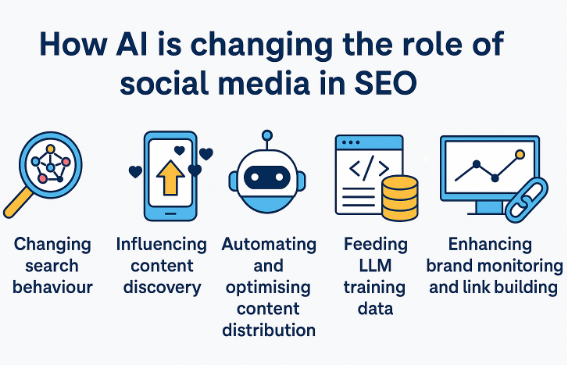
Case studies: Successful integration of social media and SEO
Leading brands and agencies are proving that social media and SEO work better together. By combining strategic content, consistent engagement and smart amplification, they have achieved measurable improvements in search visibility.
These success stories show what is possible when social activity is aligned with a clear SEO objective.
Adobe: Using influencer partnerships to build authority and traffic
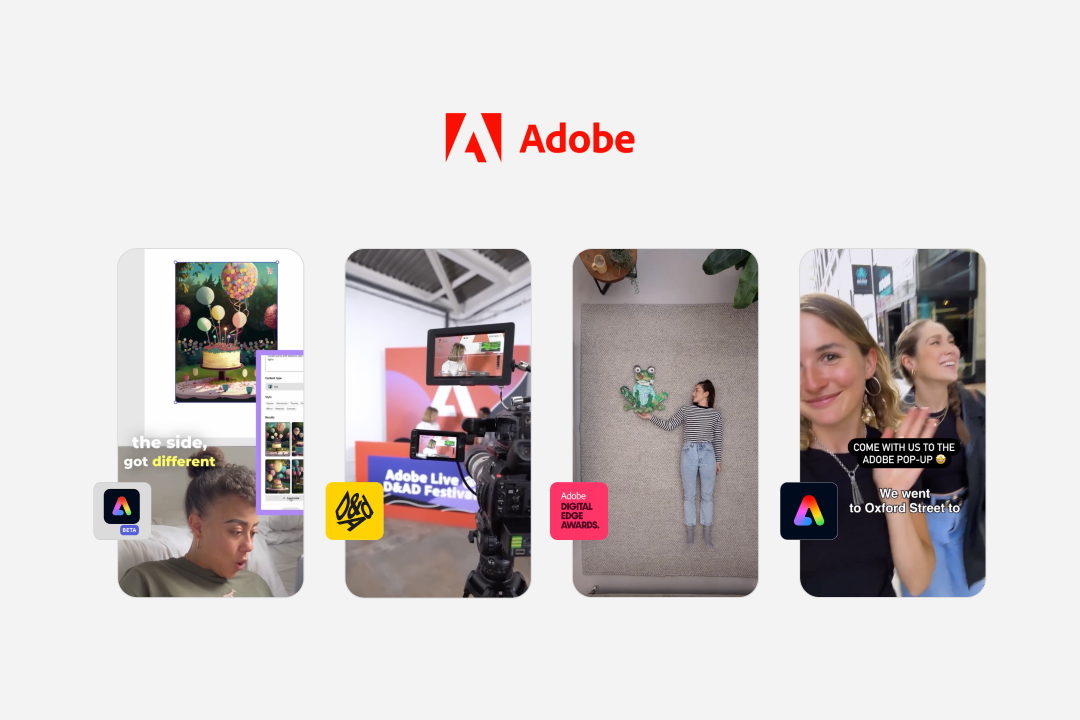
Adobe extends the reach of its content by collaborating with respected creators in design and tech. These partnerships generate genuine buzz and position the brand as a trusted authority.
Influencers promote Adobe’s tools and resources through authentic, experience-based content. This leads to:
-
Backlinks from creator blogs and media outlets
-
Sustained referral traffic from social shares
-
A rise in brand mentions that strengthens search visibility
By focusing on high-trust amplification, Adobe demonstrates how influencer-led campaigns can drive both traffic and domain authority through strategic link promotion.
Girl Power Marketing: Humanising engagement to boost visibility
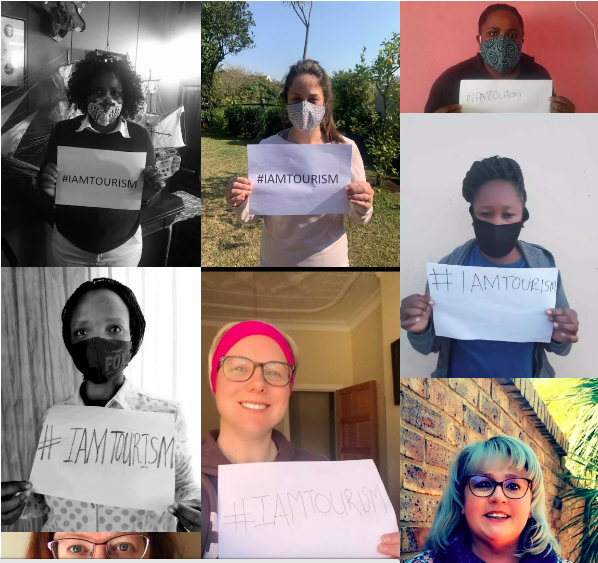
Girl Power Marketing builds brand trust through real, conversational interactions. By actively responding to comments and messages, they create a sense of connection that goes beyond content.
This high-touch approach delivers:
-
Stronger brand affinity and more frequent social shares
-
An increase in organic brand mentions across platforms
-
Greater visibility for their profiles in search results
Their success shows that consistent, authentic engagement is not just good branding. It is also a smart way to improve discoverability and support long-term SEO growth.
Ahrefs: Scaling reach through creator collaborations
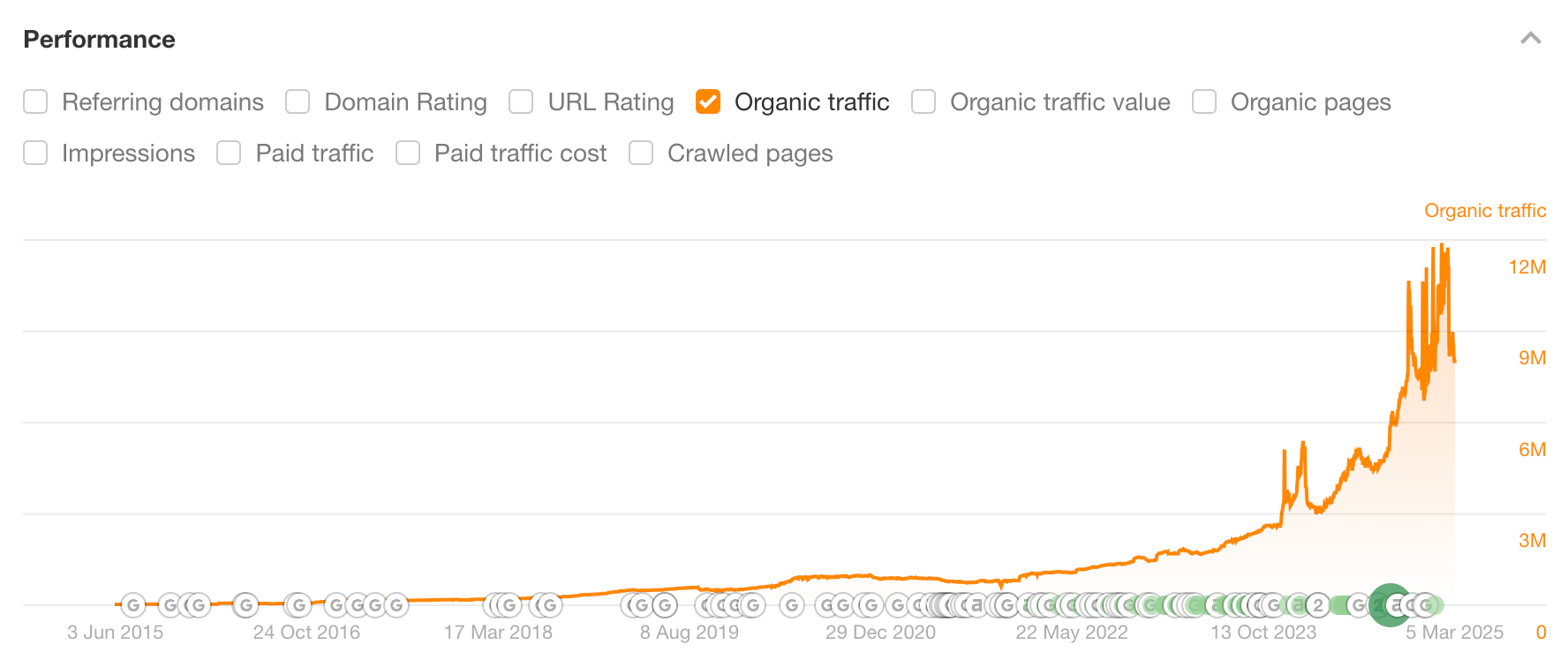
Source: https://ahrefs.com/blog/sponsoring-creators/
Ahrefs grows its brand by partnering with SEO-focused creators. In exchange for access to tools and data, these creators produce tutorials, reviews and educational content that feature Ahrefs at the core.
This strategy delivers:
-
Backlinks from high-authority blogs and YouTube channels
-
A steady stream of social mentions and content shares
-
Stronger brand presence across both social and search platforms
By putting creators first, Ahrefs expands its reach, attracts qualified traffic and reinforces its authority in the SEO space.
Pro tip: Study what works for others in your space. If a tactic is earning shares and backlinks for top brands, there is a good chance you can adapt and scale it for your niche.
Why social media belongs in your SEO strategy
Social media may not be a direct ranking factor, but it influences the signals that matter most: traffic, backlinks, engagement and brand visibility. Ignoring it means missing out on real opportunities to expand your reach and strengthen your search presence.
By consistently sharing valuable content, optimising your profiles, collaborating with trusted voices and staying engaged with your audience, you create momentum across both search and social.
When your social media activity supports your SEO goals, you build a feedback loop that increases brand awareness, drives qualified traffic and supports long-term growth.
Start connecting the dots now. The more aligned your channels are, the easier it becomes for people and search engines to find and trust your brand.
FAQs about how social media affects SEO
How does social media affect SEO?
Social media supports SEO by increasing the visibility and reach of your content. When posts are shared, liked or commented on, they attract more attention. This can drive traffic and earn backlinks, both of which contribute to stronger search performance.
How does social media affect SEO and website traffic?
Social platforms act as discovery tools. When your content gains traction, it brings more visitors to your website. Higher engagement and time on site help strengthen authority signals that support SEO outcomes.
How do SEO and social media work together?
SEO makes your content findable in search engines. Social media amplifies that content and connects it with broader audiences. Together, they form a complete visibility strategy across platforms.
Can my social profiles appear in search engine results pages?
Yes. Well-optimised social profiles often show up in search, especially for brand or name-related queries. Use relevant keywords, link back to your website and keep your profiles active to improve visibility.
Do social signals influence my site's SEO?
They do, indirectly. Shares, likes, comments and mentions show that your content is relevant and valuable. These signals can lead to more backlinks and greater exposure, which help improve SEO.
What are some effective social media SEO strategies?
Optimise your social profiles with the right keywords. Add sharing buttons to your website. Collaborate with influencers. Post consistently and engage with your audience. Use data to track what performs well and adjust your approach.
How can I use social media to boost organic traffic?
Create helpful, engaging content that speaks to your audience. Include strong calls to action, relevant hashtags and direct links to your site. The more your content is seen and shared, the more traffic and backlinks you can earn.
What is the 5 5 5 rule on social media?
The 5 5 5 rule recommends that for every 15 posts you share: five should educate or add value, five should build community or conversation, and five can be promotional. It helps keep your content balanced and audience-focused.
How does social media activity impact off-page SEO?
Social media helps build off-page SEO by encouraging shares, brand mentions and external links. These actions increase your authority and trustworthiness, both of which are key factors in how search engines rank your site.
About the author
Alessandro Boscolo Conway — Hello Digital
I'm a Dublin-based freelance SEO and digital marketing consultant with over 20 years of experience, including time on Google Ireland’s Search Quality team. I run Hello Digital, a consultancy that helps startups and small businesses across Ireland grow online through clear strategy, expert delivery, and practical support.
I've worked with over 50 Irish companies to improve their visibility, generate better leads, and grow sustainably through SEO and digital marketing. I'm a certified Google Partner and a trusted advisor to e-commerce brands, local services, and fast-growing startups.
-
Based in Dublin, 20+ years of experience
-
Former Googler, certified Google Partner, SEO strategist, and performance marketer
-
Trusted by 50+ Irish startups, e-commerce brands, and local businesses
-
Learn more about Hello Digital
Ready to use social media to boost your SEO?
Knowing how social media supports SEO is only the beginning. If you are a business owner in Ireland aiming to grow your website traffic, improve search visibility and strengthen your online presence, expert guidance can accelerate your progress.
Whether you need help developing a content strategy, building backlinks through social media or aligning your posts with clear SEO goals, I can help you connect the dots with a personalised approach that delivers results.
Book a free consultation today and find out how to make your social media work harder for your SEO strategy.








